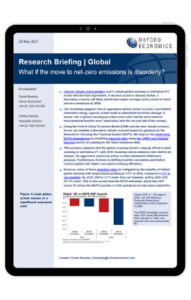What if the move to net-zero is disorderly?

Current climate action pledges won’t contain global warming to well below 2°C in line with the Paris Agreement. If decisive action is delayed further, a disorderly scenario will likely unfold and require stronger policy action to reach net-zero emissions by 2050.
Our modelling suggests that an aggressive global carbon tax policy and limited renewable energy capacity would result in substantial economic damage. A slower rate of global warming provides some relief, but the most material environmental benefits won’t materialise until the second half of the century.
Download this report to learn about:
- Late policy action comes at a significant economic cost
- Carbon tax pushes inflation higher, until a shift towards cheaper energy sources
- Recycling revenues mitigates the economic damage of transition in short term
Tags:
Related Services

Post
US Rolls Up Welcome Mat for International Travel
Research Briefing What if the move to net-zero is disorderly? Trump tariffs set to raise effective rate above 1930s levels.
Find Out More
Post
Initial takeaways from Trump’s ‘Liberation Day’ announcement
In two or three years' time, US imports could fall by around 15% due to discounted reciprocal tariff hikes.
Find Out More